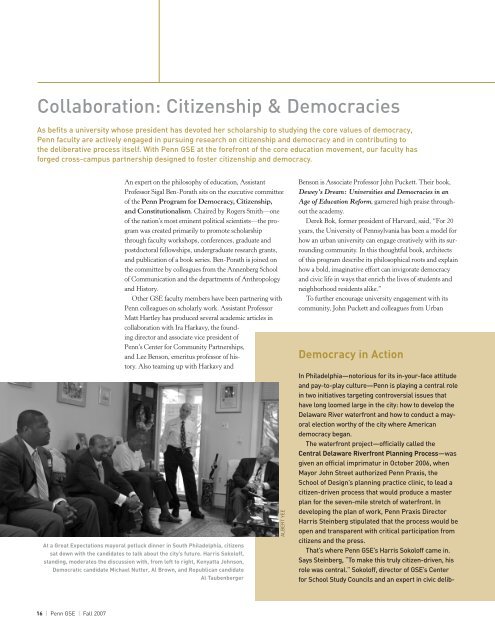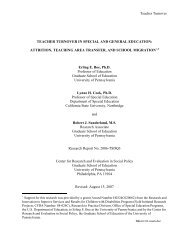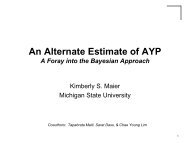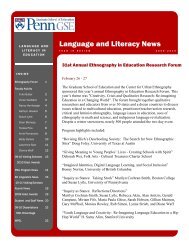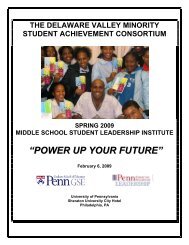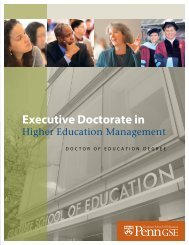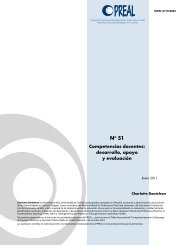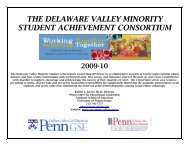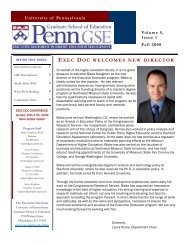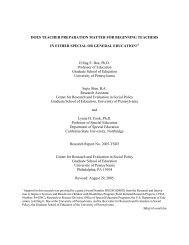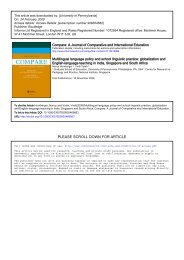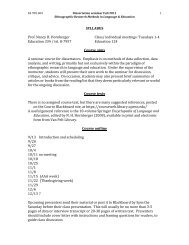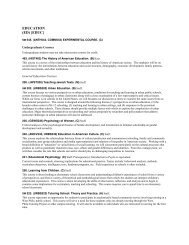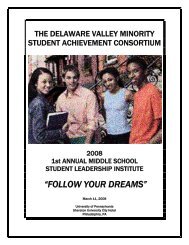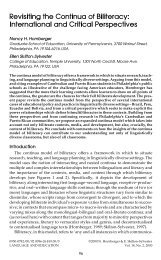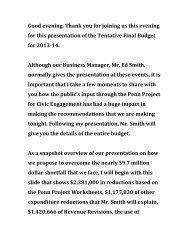C1 Cover_S06.qxd - Penn GSE - University of Pennsylvania
C1 Cover_S06.qxd - Penn GSE - University of Pennsylvania
C1 Cover_S06.qxd - Penn GSE - University of Pennsylvania
Create successful ePaper yourself
Turn your PDF publications into a flip-book with our unique Google optimized e-Paper software.
Collaboration: Citizenship & Democracies<br />
As befits a university whose president has devoted her scholarship to studying the core values <strong>of</strong> democracy,<br />
<strong>Penn</strong> faculty are actively engaged in pursuing research on citizenship and democracy and in contributing to<br />
the deliberative process itself. With <strong>Penn</strong> <strong>GSE</strong> at the forefront <strong>of</strong> the core education movement, our faculty has<br />
forged cross-campus partnership designed to foster citizenship and democracy.<br />
16 | <strong>Penn</strong> <strong>GSE</strong> | Fall 2007<br />
An expert on the philosophy <strong>of</strong> education, Assistant<br />
Pr<strong>of</strong>essor Sigal Ben-Porath sits on the executive committee<br />
<strong>of</strong> the <strong>Penn</strong> Program for Democracy, Citizenship,<br />
and Constitutionalism. Chaired by Rogers Smith—one<br />
<strong>of</strong> the nation’s most eminent political scientists—the program<br />
was created primarily to promote scholarship<br />
through faculty workshops, conferences, graduate and<br />
postdoctoral fellowships, undergraduate research grants,<br />
and publication <strong>of</strong> a book series. Ben-Porath is joined on<br />
the committee by colleagues from the Annenberg School<br />
<strong>of</strong> Communication and the departments <strong>of</strong> Anthropology<br />
and History.<br />
Other <strong>GSE</strong> faculty members have been partnering with<br />
<strong>Penn</strong> colleagues on scholarly work. Assistant Pr<strong>of</strong>essor<br />
Matt Hartley has produced several academic articles in<br />
collaboration with Ira Harkavy, the founding<br />
director and associate vice president <strong>of</strong><br />
<strong>Penn</strong>’s Center for Community Partnerships,<br />
and Lee Benson, emeritus pr<strong>of</strong>essor <strong>of</strong> history.<br />
Also teaming up with Harkavy and<br />
At a Great Expectations mayoral potluck dinner in South Philadelphia, citizens<br />
sat down with the candidates to talk about the city’s future. Harris Sokol<strong>of</strong>f,<br />
standing, moderates the discussion with, from left to right, Kenyatta Johnson,<br />
Democratic candidate Michael Nutter, Al Brown, and Republican candidate<br />
Al Taubenberger<br />
ALBERT YEE<br />
Benson is Associate Pr<strong>of</strong>essor John Puckett. Their book,<br />
Dewey’s Dream: Universities and Democracies in an<br />
Age <strong>of</strong> Education Reform, garnered high praise throughout<br />
the academy.<br />
Derek Bok, former president <strong>of</strong> Harvard, said, “For 20<br />
years, the <strong>University</strong> <strong>of</strong> <strong>Penn</strong>sylvania has been a model for<br />
how an urban university can engage creatively with its surrounding<br />
community. In this thoughtful book, architects<br />
<strong>of</strong> this program describe its philosophical roots and explain<br />
how a bold, imaginative effort can invigorate democracy<br />
and civic life in ways that enrich the lives <strong>of</strong> students and<br />
neighborhood residents alike.”<br />
To further encourage university engagement with its<br />
community, John Puckett and colleagues from Urban<br />
Democracy in Action<br />
In Philadelphia—notorious for its in-your-face attitude<br />
and pay-to-play culture—<strong>Penn</strong> is playing a central role<br />
in two initiatives targeting controversial issues that<br />
have long loomed large in the city: how to develop the<br />
Delaware River waterfront and how to conduct a mayoral<br />
election worthy <strong>of</strong> the city where American<br />
democracy began.<br />
The waterfront project—<strong>of</strong>ficially called the<br />
Central Delaware Riverfront Planning Process—was<br />
given an <strong>of</strong>ficial imprimatur in October 2006, when<br />
Mayor John Street authorized <strong>Penn</strong> Praxis, the<br />
School <strong>of</strong> Design’s planning practice clinic, to lead a<br />
citizen-driven process that would produce a master<br />
plan for the seven-mile stretch <strong>of</strong> waterfront. In<br />
developing the plan <strong>of</strong> work, <strong>Penn</strong> Praxis Director<br />
Harris Steinberg stipulated that the process would be<br />
open and transparent with critical participation from<br />
citizens and the press.<br />
That’s where <strong>Penn</strong> <strong>GSE</strong>’s Harris Sokol<strong>of</strong>f came in.<br />
Says Steinberg, “To make this truly citizen-driven, his<br />
role was central.” Sokol<strong>of</strong>f, director <strong>of</strong> <strong>GSE</strong>’s Center<br />
for School Study Councils and an expert in civic delib-


